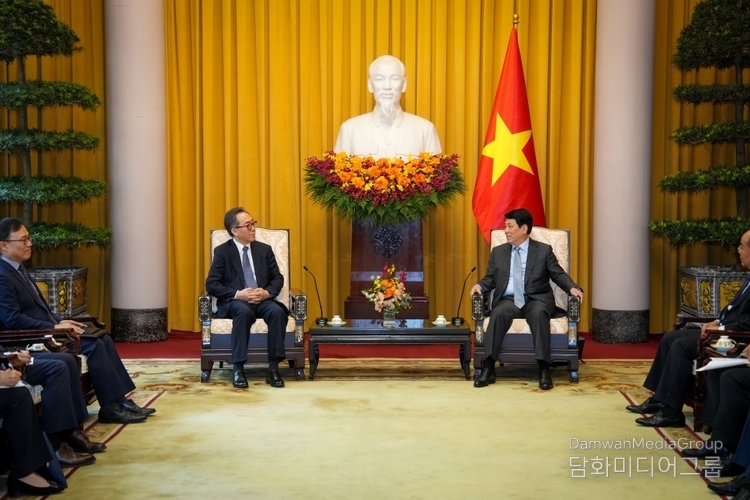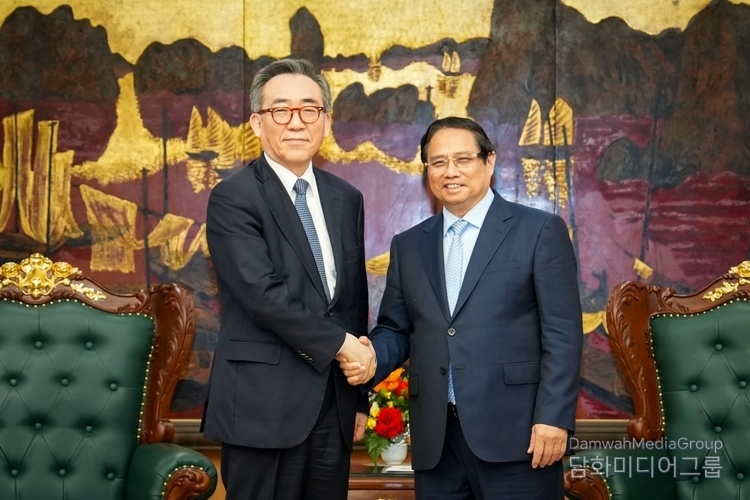By Diplomacy Journal Kayla Lee
Minister of Foreign Affairs Cho Tae-yul, who is on an official visit to Vietnam, met with Vietnamese Prime Minister Pham Minh Chinh and Vietnamese State President Luong Cuong on April 16.
Prime Minister Chinh thanked Minister Cho for attending the 4th P4G Summit on behalf of the ROK government and expressed his appreciation for the significant contributions of Korean companies in Vietnam to bilateral economic cooperation and Vietnam's economic development, and looked forward to expanding investment by Korean companies in areas such as semiconductors and industrial human resources training.

In his remarks to the media, Prime Minister Chinh expressed his willingness to actively cooperate with the Korean side on the new nuclear power plant project in Vietnam, and said that he would continue to pay close attention to resolving difficulties for Korean businesses and supporting the Korean diaspora.
In response, Minister Cho said that the second Korea-Vietnam Foreign Ministers' Dialogue confirmed that the agreements reached at the bilateral summit are being implemented steadily, and that the two countries will continue to work closely together to actively implement the agreements, including reaching $150 billion in trade volume by 2030.
Cho expressed his appreciation for Prime Minister Chinh's active support for the activities of Korean enterprises in Vietnam, including hosting a meeting for Korean enterprises in March to directly listen to their concerns and seek solutions.
Minister Cho introduced that he held a meeting with Korean compatriots and businesses as the first event of his visit to Vietnam, and asked for continued support for Korean businesses and the Korean community in resolving difficulties such as licensing, tax refunds, and labor and residence permits, and expressed his hope that Prime Minister Chinh's interest and support for large-scale strategic cooperation projects such as nuclear power plants and high-speed rail projects will lead to concrete results.

State President Luong Cuong welcomed Minister Cho on his official visit to Vietnam, calling the Republic of Korea a reliable and key partner and looking forward to further developing bilateral ties.
He welcomed the participation of outstanding Korean companies in Vietnam's nuclear power plant, high-speed rail, and other projects, and expressed his expectation to attend the APEC Leaders' Meeting in Gyeongju this year.
Minister Cho stressed that bilateral relations between Vietnam and Korea are at their best, and expressed his expectation that the two countries, as comprehensive strategic partners, will expand cooperation not only in trade and investment, but also in areas of great strategic importance, such as defense and energy, including nuclear power plants, and large-scale infrastructure, including high-speed rail.
Cho said he hopes that Korea, which is chairing APEC this year, and Vietnam, which will chair APEC in 2027, will actively promote cooperation at the APEC level, and welcomed President Cuong's participation in this year's Gyeongju APEC Leaders' Meeting.
Cho expressed concern over North Korea's continued provocations, including Russia's illegal military cooperation with North Korea in the war in Ukraine, and asked Vietnam to continue to play a constructive role in halting North Korea's provocations.
In response, President Cuong said he has consistently conveyed Vietnam's position for peace on the Korean Peninsula in his contacts with North Korea.
During his meeting with PM Chinh and President Cuong, Minister Cho expressed his hope that Vietnam and the United States will continue to communicate closely on the recent U.S. reciprocal tariff measures, expressed his appreciation for Vietnam's efforts to ensure that the interests of Vietnamese businesses are reflected in the consultation process with the United States, and asked Vietnam to continue its efforts in the upcoming formal negotiations.
Minister Cho's visit to Vietnam is considered an important opportunity to reaffirm the two sides' commitment to developing a comprehensive strategic partnership and to further strengthen strategic and forward-looking cooperation in areas such as nuclear power and high-speed rail.
